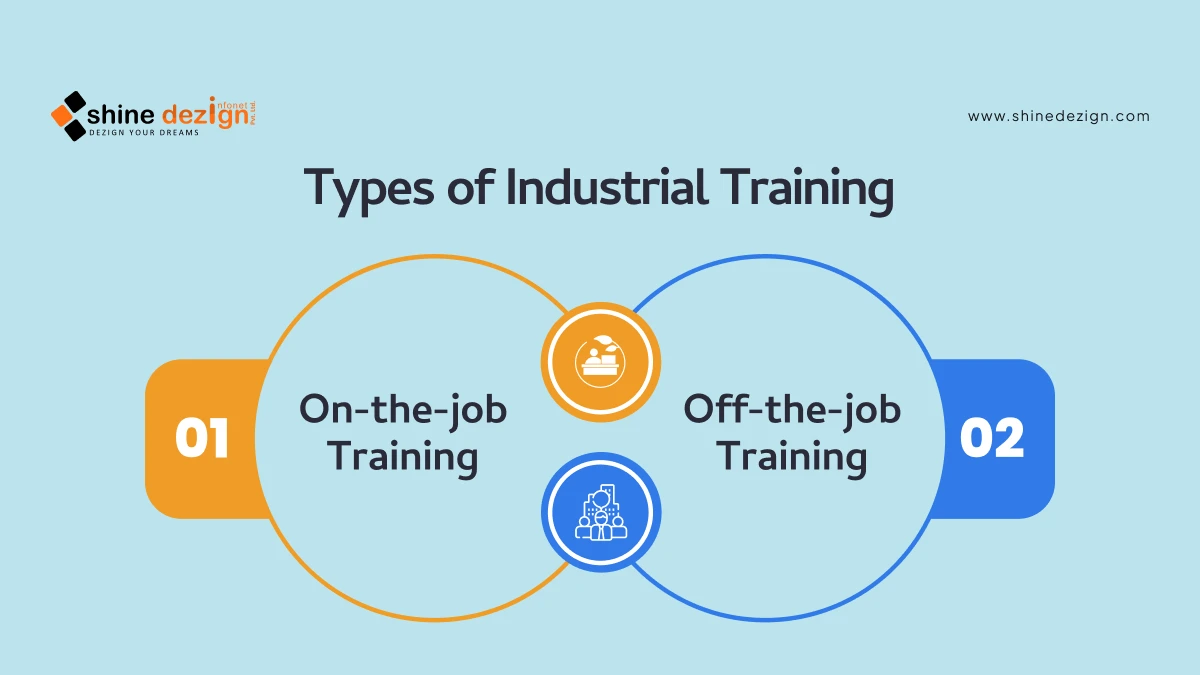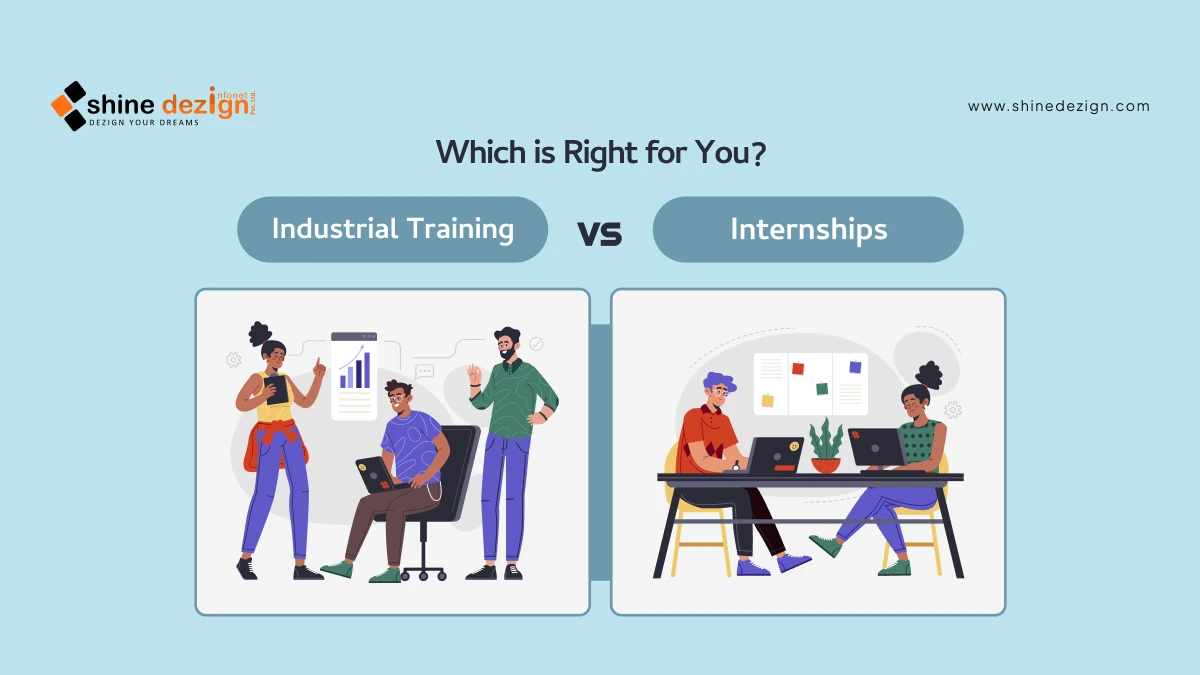Having practical experience along with theoretical knowledge is essential for an individual to outshine in the job market. Students, employees and jobseekers can enhance their practical skills by joining industrial training or internships.
But it is slightly difficult to choose between industrial training or internships. Both the internship and training programs are beneficial for individuals as they offer various insights and knowledge of real-world problems.
Here in this blog, you will get a well analyzed difference between Industrial training and Internships to choose the right path for enhancing your career opportunities.
What is industrial training?
Industrial training is the process of investing in the skills and performance of employees to prepare them for the job.
In simpler words, when a company hires a person for the particular job role and responsibilities, then they train that person specific skills to make them suitable for the job.
What are the types of industrial training?
Industrial training has further been divided into two categories i.e. On-the-job Training and Off-the-job Training. These two categories have different types of industrial training methods.

On-the-job Training
On-the-job training consists of a few forms of training methods such as Job rotation, Apprenticeship training, Internship training, Induction training and coaching.
1. Job rotation:
Job rotation means when employees switch or rotate jobs within the same organization. The job rotation is either vertical or horizontal. The vertical job rotation means when one employee is promoted from lower to higher job rank. And horizontal job rotation means when employees rotate their job roles and responsibilities within the same level.
2. Apprenticeship training:
The training provided to the employees who wish to join skilled jobs, by the trained professionals to learn the required skills. This is known as apprentice training. Once the employee learnt those skills, they took over the job role and then the trainer turns to a supervisor.
3. Internship training:
These are the training programs designed by the universities to provide practical training in companies to the students so that they can learn about work culture and skills.
4. Induction training:
In an induction training the new hires are familiarized with the organization and the job, superior and subordinates, so it is conducted to make them familiar with the work environment and culture.
5. Coaching:
In this training method, the senior or superior guides the trainees about the skills and jobs.
Off-the-job Training
Whereas Off-the-job training is divided into Computer modeling, films, case studies, Vestibule training, Conference training, and programmed instructions methods:
1. Computer modeling:
Computerized stimulation techniques are used for training provided to the trainees or employees.
2. Films:
Movies, documentaries and short films are used to showcase skills which cannot be demonstrated to the employees.
3. Case studies:
The employees are given case studies for discussion, and they are expected to take an active part in the discussion. The discussion is performed in an open communication environment and all the aspects of the issue are taken into consideration.
4. Vestibule training:
This training method is designed for the staff who regularly work with technical equipment like tools, machinery, etc. They are provided with training at the workplace to operate and manage the equipment. Other training methods are Conference training and Programmed instructions.
What are the pros and cons of industrial training?
The pros of Industrial training
1. It provides hands- on learning experience.
2. Enhances skill development.
3. It provides networking opportunities to the employees.
4. Improved employability.
5. It provides potential job offers.
The cons of Industrial training
1. Limited exposure to different roles
2. It provides potential for only monotonous tasks
3. It may not always align with career goals
What is an Internship?
An internship is an on-the-job training in which students and college, or universities graduates gain practical knowledge and learn skills required for the specific field. Internships are most of the time unpaid or generally low paid.
Typically, the internship duration varies from 3 months to a year, but it can be different depending on the company and the skill requirements. Most of the internships are either paid or unpaid.
What are the characteristics of Internship?
The internship has different characteristics. These are:
1. Focus on Practical Experience:
The primary goal is to provide hands-on experience in a specific field or role. Interns apply theoretical knowledge learned in academics to real-world situations.
2. Real-World Application:
Internships offer a chance to work on actual projects, contribute to the company’s work, and gain practical skills relevant to a chosen career path.
3. Mentorship and Guidance:
Interns typically work under the supervision of a mentor or supervisor who provides guidance, feedback, and support.
4. Networking Opportunities:
Internships facilitate networking within the company and industry. Interns have the opportunity to connect with professionals, build relationships, and expand their professional network.
5. Career Exploration:
Internships allow students to explore different career paths, gain insights into specific industries, and determine if a particular field aligns with their interests and goals.
6. Skill Development:
Internships contribute to the development of various professional skills, including communication, teamwork, problem-solving, time management, and critical thinking.
7. Resume Builder:
Internships provide valuable work experience that enhances resumes and CVs, making graduates more competitive in the job market.
8. Potential for Full-Time Employment:
Successful internships can sometimes lead to full-time job offers within the same company or other opportunities in the industry.
What are the pros and cons of an Internship?
The pros of an Internship
1. It provides in-depth experience in the specific field.
2. It offers mentorship and guidance.
3. Opportunities of networking within a company.
4. Potential for full-time job offers.
5. Helps in enhancing the improved understanding of career paths.
The cons of an Internship
1. Competitive application process.
2. Potential for unpaid or low-paid positions.
3. It may not always guarantee a job offer.
What is the difference between industrial training and internship?
The key difference between industrial training and internships are:
1. Purpose
Industrial training focuses on teaching students, employees or university graduates the required skills and technologies.
Whereas Internships foster on providing hands-on learning experience to the interns or students.
2. Timings
The training period generally lasts for a few days and a few hours.
But the duration of internship programs ranges from three months to a year or more if required.
3. Eligibility criteria
Industrial training can be opted for by every employee of the company.
But internships are only open for students or recent graduates.
4. Paid or Unpaid
Training is mostly unpaid.
But internships can be paid or unpaid depending on the company’s rules and regulations.
Other differences between Industrial training and internships are:
| Feature | Industrial Training | Internships |
| Focus | Applying theoretical knowledge in a real-world setting. | Gaining practical experience in a specific role or department. |
| Duration | It can vary significantly, from short-term to long-term programs. | It is typically shorter-term, ranging from a few weeks to several months. |
| Structure | It is more structured, often with defined training modules and assessments. | More flexible, with tasks and projects assigned based on the specific role and company needs. |
| Level of Responsibility | It may involve more basic tasks and observation. | It often involves more responsibility and independent work. |
| Application Process | It may have less formal application requirements. | Often involves a competitive application process, including resumes, cover letters, and interviews. |
| Career Impact | It enhances skills and knowledge, improves employability. | Provides valuable work experience, builds professional networks, and increases career exploration opportunities. |
| Compensation | It can be paid or unpaid, depending on the program. | Can be paid or unpaid, with paid internships becoming increasingly common. |
How do industrial training and internship impact career opportunities?
Impact of Industrial Training on Career Opportunities
1. Enhanced Skills:
Industrial training equips individuals with practical skills, bridging the gap between theoretical knowledge and real-world application. This makes them more employable and valuable to potential employers.
2. Improved Employability:
The hands-on experience gained during industrial training demonstrates a strong work ethic, adaptability, and the ability to learn new skills quickly. These qualities are highly valued by employers.
3. Networking Opportunities:
Industrial training often provides opportunities to network with industry professionals, which can lead to valuable connections and potential job leads.
4. Increased Confidence:
Successfully completing industrial training boosts self-confidence and can improve interview performance.

Impact of Internships on Career Opportunities
1. Resume Builder:
Internships provide valuable work experience that significantly enhances resumes and CVs.
2. Skill Development:
Internships foster the development of a wide range of professional skills, including communication, teamwork, problem-solving, time management, and critical thinking.
3. Career Exploration:
Internships allow individuals to explore different career paths, gain insights into specific industries, and determine if a particular field aligns with their interests and goals.
4. Networking:
Internships provide excellent networking opportunities within the company and industry, allowing individuals to build relationships with professionals and expand their professional network.
5. Increased Job Prospects:
Successful internships can lead to full-time job offers within the same company or other opportunities in the industry.
Summing Up
Both industrial training and internships offer valuable opportunities for personal and professional growth. Industrial training focuses on developing a broad skillset and applying theoretical knowledge, while internships provide in-depth experience within a specific role or department.
The best choice depends on your individual career goals, academic background, and personal preferences. By carefully considering the key differences and exploring both options thoroughly, you can make an informed decision that will best support your career aspirations.
Your questions, our answers
College graduates and students can apply for internships at various companies.
The characteristics of internship are: - Focus on Practical Experience Real-World Application Mentorship and Guidance Networking Opportunities Career Exploration
Industrial training is divided into two categories: On-the-job Training and Off-the-job Training. Further these two categories have different methods of training like Job rotation, Apprenticeship training, Internship, Induction, Conference training and many others.
The training period generally lasts for a few days and a few hours. But the duration of internship programs ranges from three months to a year or more if required.













